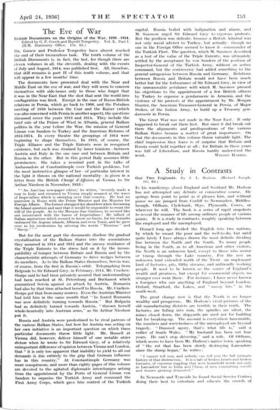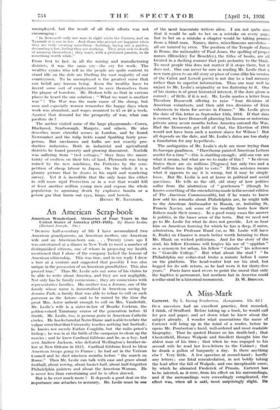A Study in Contrasts
IN his wanderings about England and Scotland Mr. Hodson
has not attempted any definite or consecutive course. He springs from point to point as it pleases him, and without pause we are jumped from Cardiff to Newmarket, Middles- brough, Oldham, Clydebank, Skye, Ply th, Cowes, or
wherever he will. The book is a series of rapid snapshots to reveal the manner of life among ordinary people at various points.. It is 'a study in Contrasts, roughly speaking between
the employed and the unemployed.
Disraeli long ago divided the English into two nations, by which he meant the poor and the well-to-do, but until quite lately I have always drawn the most definite dividing line between the North and the South. To many people living in the South, as to all American and other visitors, the North is an unknown land, except to those who motor or tramp through the Lake country. For the rest an unknown land extended north of the Trent– an unpleasant land of factories, pits, filthy streams; and unfriendly working people. It used to be known as the source of England's wealth and greatness, but except for commercial objects no
stranger ever went there. Fin- instance, I have never known a foreigner who saw anything of England beyond London, Oxford, Stratford, the Lakes, and " mossy bits " in the south-west.
The great change now is that the North is no longer wealthy and prosperous. Mr. Hodson's vivid pictures of the old manufacturing districts are terrible in their truth. The factories are falling into ruin, the spindles are silent, the mines closed down, the shipyards are used not for Wilding but for breaking-up. The account is everywhere lamentable, the numbers and wretchedness of the unemployed are beyond tragedy. "Damned agony, that's what life is," said a collier of South Wales. "My husband has been out four years. He can't stop shivering," said a wife. Of Oldham,
which seems to have been Mr. Hodson's native town, speaking of "the rot that has been slowly destroying Lancashire since the slump began," he writes :
"I cannot tell you, and nobody van tell you the full intimate history of that destruction. It is a tale of broken hearts anal broken fortunes, of concerns toppling that were household words not only in Lancashire but in India and China, of men committing suicide and Women growing demented."
In Newcastle and Tyneside he found Social Service Centres doing their best to entertain and educate the crowds of unemployed, but the result of all their efforts was not encouraging :
"In Newcastle only one man in eight visits the Centres; and on Tyneside it is one in ten. And those who attend are happiest when they are truly creating something—building, laying out a garden, decorating a hut, feeling they are working. They grow sick to death of amusing themselves; they want, with a profound passion, to do something worth while."
From first to last, in all the mining and manufacturing districts, it was the same cry—the cry for work. The
wealthy cynics who tell us the people are quite content to stand idle on the dole are libelling the vast majority of our countrymen. To be unemployed is the greatest curse that can befall any human being. Even the wealthy have to invent some sort of employment to save themselves from the plague of boredom. Mr. Hodson tells us that in various places he heard the one solution : "What we want is another war" ! The War was the main cause of the slump, but men and especially women remember the happy days when -Work was abundant, and wages mounted to 15 or 16 a week. Against that demand for the prosperity of war; what can pacifists do ?
The author visited some of the large playgrounds—Cowes, Blackpool, Scarborough, Margate, and others. He also describes more cheerful scenes in London, and he found Newmarket and the tulip fields round Spalding fairly pros- perous. But racehorses and bulbs are not exactly pro- ductive industries. Both in industrial and agricultural districts he found poverty and growing discontent. Norfolk was suffering from "tied cottages," Skye from the uncer- tainty of crofters on their bits of land, Plymouth was being ruined by the new machines, the Potteries by the com- petition of cheap labour in Japan. On the whole it is a gloomy picture that he draws in his rapid and wandering survey. Yet it is incredible that the only hope lies either in still more rigid Protection or in a war that would kill at least another million young men and expose the whole population to agonising death by explosive bombs or a poison gas that burns out eyes, lungs, and bowels.
HENRY W. NEV1NSON.



















































 Previous page
Previous page